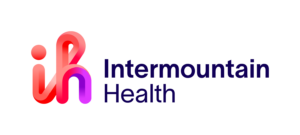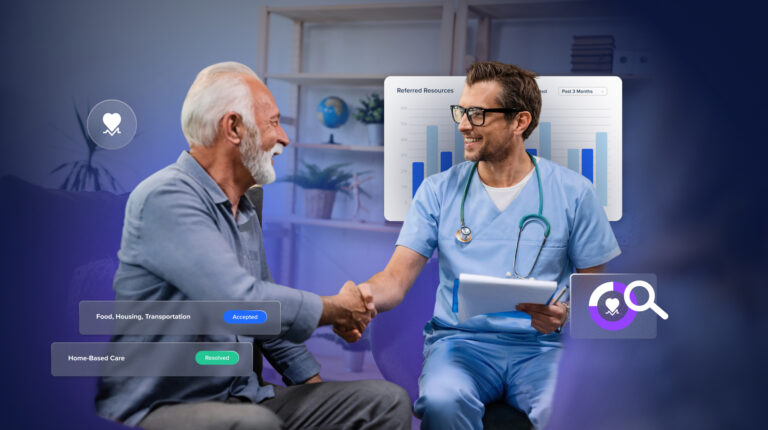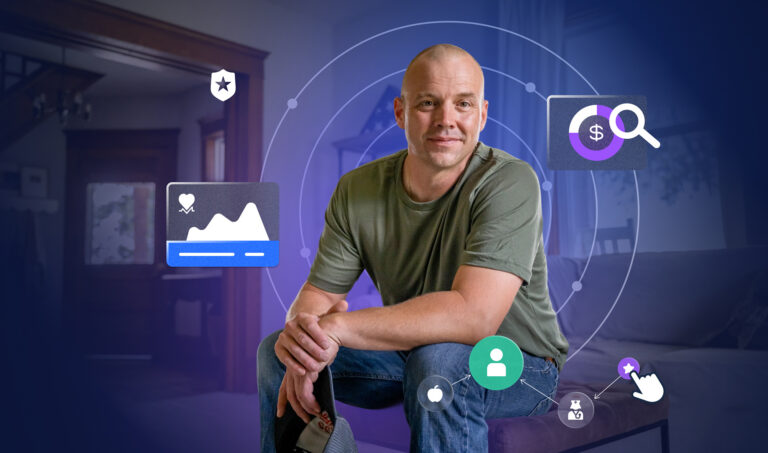
Mobilizing for Action: The Importance of Cross-Sector Collaboration

As organizations continue to identify opportunities to optimize social care coordination across the U.S., it is important that they aim to have a better understanding of community-based organizations (CBOs) and other community health partners’ experiences and perspectives. Only then can significant strides be made in leveraging the unique strengths of each community, building robust networks, and creating technology that complements—rather than competes with—local efforts.
Collaboration Through Evaluation
As partners in building and growing our networks, Intermountain Health and CyncHealth share our vision of reducing barriers to community-engaged social care coordination and advocating for the use of effective tools that both facilitate and encourage cross-sector collaboration. To dig deeper into the unique motivators, facilitators, and barriers CBOs encounter when participating in coordinated care networks, a multi-network evaluation was conducted.
This collaborative effort was executed using qualitative methods, including key informant interviews and focus groups with organizations in the Unite Nebraska and Unite Utah network geographic regions. Our goal was simple: to highlight the unique perspective of community-based organizations related to care coordination broadly and the role of technology specifically. Participants were selected based on their respective knowledge of and experience with supporting customers, overseeing teams, or personally adopting and using the Unite Us Platform.
“The greatest success is we have connected with more clients through Unite Us.”— CBO Partner
Upon completion, the evaluation identified various best practices for optimizing community-level buy-in of social care coordination tools. Key findings underscored the importance of:
- Fostering a sense of accountability and community amongst network participants
- Establishing clear expectations around integrating care coordination into daily workflows
- Seeking out opportunities to listen and identify community needs with participating stakeholders
Looking Forward
Just as the Unite Us Platform is meant to address and mitigate siloed social care, so too must we mitigate siloed community work to build healthy social care networks that meet community needs. To do this effectively, we need to be realistic and transparent about our shared responsibilities while also proactively seeking out opportunities in which we can collaborate across sectors.
While technology and infrastructure are a critical piece in driving success, they cannot alone address the systemic and structural barriers to true cross-sector collaboration. To increase buy-in and produce conditions conducive to technology-driven solutions, the work of social care coordination must ultimately be a community-engaged and supported effort.
Download our flyer, Mobilizing for Action, to learn more about this collaborative effort between CyncHealth, Intermountain Health, and Unite Us.
Lessons Learned
Q: What did you learn from this cross-sector collaboration?
Unite Us: It’s been so valuable to work with two healthcare organizations who are actively engaged in the community. We learned through this work just how important an all-hands-on-deck approach is to successful collaboration. We all have our roles to play, and importantly, regional healthcare leaders are critical in bringing the community together to achieve collective impact.
CyncHealth: Successful cross sector-collaboration requires partnerships across healthcare, community, and technology partners. This collaboration reinforced that building a social care ecosystem is difficult and the barriers faced in building that ecosystem are often similar across the country. We valued the opportunity to share and learn from peers pursuing similar work.
Intermountain Health: Social care coordination tools are most effective when our valued community partners broadly use them. This evaluation helped us share practices we believe are effective methods to generate partner buy-in and learn about what’s also working for CyncHealth.
Q: What makes this evaluation different from others like it?
Unite Us: Most healthcare organization evaluations focus on return on investment (ROI) and cost savings achieved by addressing drivers of health (DOH). What was different about this evaluation was that it was two healthcare organizations with different missions and in different regions coming together to focus on what more they can do to support the community, improve cross-sector collaboration, and ultimately to improve population health.
CyncHealth: A social care network cannot exist without the voice and partnership of the community organizations directly providing services to clients. This evaluation helps us understand how those implementing these networks can be better community partners and ensure the community voice is heard and amplified in this work. As community partners are further integrated into the healthcare space, we hope that evaluations like this one will lead to stronger partnerships.
Intermountain Health: Holistic patient care coordination requires partners outside of healthcare, and we need technology and relationships to bridge patients to those services effectively. This is a new type of collaboration for Intermountain. This evaluation helped us understand where our implementation of a coordinated network was most effective and where we have opportunities to improve with the added benefit of shared learnings and best practices with CyncHealth and Unite Us.
Q: Why are these types of evaluations important?
Unite Us: Cross-sector collaboration and DOH strategies are trending across the healthcare landscape. We all know this work is important and necessary. But it is also hard and takes significant investment in building trust and rapport with community organizations. This is more easily achieved when we recognize that community organizations are the experts in addressing social needs, and we increase our chance of success when their perspectives and experiences are incorporated into a shared framework to tackle community needs together.
CyncHealth: The use of technology tools to address DOH is still a new frontier in the healthcare space. Evaluations like this allow for the collection and analysis of data to develop an objective understanding of what is happening with the implementation of these tools. From that data, we can establish a baseline and develop best practices in a space where they are still rapidly evolving.
Intermountain Health: Addressing a person’s physical, mental, and social needs requires services outside our clinic and hospital walls. We understand how our systems and processes work, but to be a good partner to other agencies we depend on for their expertise, we need to know how we best work together. Social care coordination plays a vital role in improving population health, and findings from these evaluations help us take an evidence-based approach to work collaboratively to improve community health.
About Our Partners
![]()
CyncHealth was established in 2008 as a 501(c)(3) organization with a mission to enable providers in the State of Nebraska to exchange healthcare data and support them in providing holistic and effective care to all patients. More than a decade later, CyncHealth now serves more than 1,100 facilities and connects over five million lives across the Midwest. A leader in healthcare data partnerships, CyncHealth’s health data utility serves as a healthcare data exchange to coordinate care across the continuum, improve patient care, ease the burden on providers, and create healthier communities.

Intermountain Health serves the healthcare needs of people across the Intermountain West, primarily in Utah, Idaho, Nevada, Colorado, Montana, Wyoming, and Kansas. Based in Salt Lake City, they are an integrated non-profit health system of 33 hospitals, 385 clinics, medical groups with some 3,800 employed physicians and advanced practice providers, 59,000 caregivers, a health plans division called SelectHealth with more than 1 million members, and other health services. Helping people live the healthiest lives possible, Intermountain is committed to improving community health and transforming healthcare by using evidence-based best practices to consistently deliver high-quality outcomes at sustainable costs.



